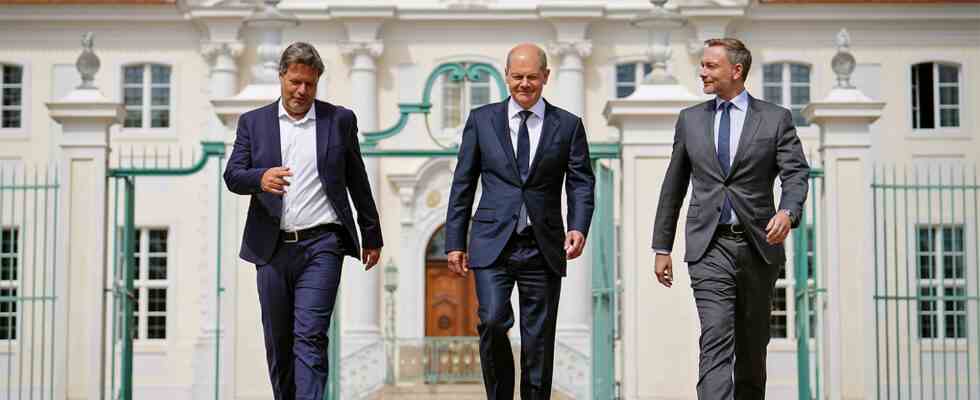analysis
Status: 04.05.2022 4:35 p.m
It was the first time that the traffic light coalition allowed itself a longer consultation period. But the 36-hour retreat of the federal government in Meseberg knew almost only one topic.
It was just eleven seconds before the word “time change” came up at the closing press conference. With which Chancellor Olaf Scholz immediately made it clear which topic dominated the traffic light cabinet retreat in the baroque palace of Meseberg: the “brutal war of aggression by Russian President Putin against Ukraine,” as Scholz emphasized. However, Putin completely miscalculated, as he now gets a “stronger NATO” and a “unified European Union”.
The EU is currently preparing to launch a sixth package of sanctions. A package that should also contain an embargo on the import of Russian oil – with a built-in time delay, however: Economics Minister Robert Habeck declared this transitional period to be long enough to create alternatives to Russian oil in Germany.
At the same time, the Greens politician warned in advance that prices could rise significantly if imports were stopped – supply could also falter in this country.
Import of LPG
In order to become more independent of Russian energy supplies – and thus less susceptible to blackmail – the federal government wants to push the import of liquid gas.
The Chancellor announced that the law to speed up the construction of the necessary terminals – the LNG Acceleration Act – now wants to get the traffic light through the cabinet by Monday. It should become law before the summer break.
Green light for sanctions
And a second project should get the green light from the traffic light ministers by the beginning of the week: the sanctions enforcement law. Contrary to what the name suggests, according to critics, there is a problem with the consistent enforcement of sanctions against individuals from Russia and their assets.
Finance Minister Christian Lindner (FDP) explained that a new instrument is being examined here: whether people who appear on sanctions lists could be obliged to disclose their assets. Which would no doubt simplify sanctioning.
The red-yellow-green trio Scholz-Lindner-Habeck was rather covered in front of the press on the subject of relief for German citizens. FDP boss Lindner was of the opinion that we were not only experiencing a security policy, but also an “economic turning point”. But in essence, the three referred to those relief packages that have already been launched.
Howitzer from the stocks?
According to the federal government, the question of whether the Ukraine will be helped with the Panzerhaubitze 2000 heavy artillery piece directly from Bundeswehr stocks has also not yet been finally decided.
“I didn’t make that decision,” Defense Minister Christine Lambrecht said in the morning. A joint contribution is currently being coordinated with the Netherlands, Chancellor Scholz added, without being more specific here.
Everything revolves around Russia
Incidentally, Russia plays an important role even when it comes to issues that superficially have little to do with the turning point in history: This also applies to the two Bundeswehr missions in the Sahel crisis-ridden country of Mali. Foreign Minister Annalena Baerbock and Defense Minister Lambrecht made it unmistakably clear that the Germans would not continue one of them, namely the EU training mission called EUTM.
This also has something to do with the presence of Russian forces in Mali: If the Malian soldiers trained by Germany went into battle with them and possibly committed human rights violations, that would be absurd, according to Lambrecht.
On the other hand, the Bundeswehr wants to continue its involvement in the UN mission called MINUSMA. However, under certain conditions: The UN would have to create the necessary conditions for the safety of German soldiers, according to the traffic light.
Among other things, it is necessary to replace the skills of the withdrawing French, who are taking combat helicopters home with them as well as soldiers.
Conclusion of the cabinet retreat: Chancellor Scholz announces further aid for Ukraine and declares an oil embargo to be manageable
Jakob Schaumann, ARD Berlin, daily news at 2:00 p.m., May 4, 2022
consequences of the war
The contrast could hardly have been more striking: For 36 hours, the traffic lights in the idyllic baroque castle of Meseberg dealt almost exclusively with the consequences of Putin’s war of aggression: with the necessary integration of fled Ukrainians into the German labor market, with the threatening food shortages due to the lack of wheat exports, with of inflation in this country.
Despite the seriousness of the matter, all three coalition partners then praised the atmosphere inside the traffic lights. Finally we had time again to “paint the big picture,” said Habeck. Because the mood in recent months could never have been as upbeat as planned when he took office, he explained. And thus pointed out that the traffic light was actually in permanent crisis mode from the start. He no longer had to use the word turning point to describe this state of affairs.
Cabinet retreat in Meseberg – turning point consequences
Kai Küstner, ARD Berlin, May 4, 2022 2:11 p.m

